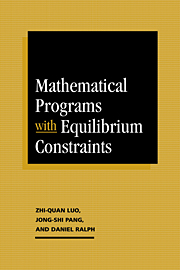2 - Exact Penalization of MPEC
Published online by Cambridge University Press: 05 December 2011
Summary
For reasons given in Section 1.1, we have seen that the general MPEC (1.1.1) is a very difficult constrained optimization problem to deal with. One reason is that the feasible region of the MPEC is defined implicitly as the solution set of a parametric variational inequality. To facilitate the design of solution procedures for MPEC, we need to represent its constraints in terms of a finite system of (nonlinear) equalities and inequalities, thus casting MPEC in the form of a standard nonlinear program. In Section 1.3, we have given various equivalent formulations of the constraints of the MPEC; in particular, the KKT forms (1.3.8) and (1.3.9) will play a major role in the study of the MPEC (1.1.1).
Once an MPEC has been formulated as a standard constrained optimization problem, such as (1.3.9), we may attempt to use any one of a number of nonlinear programming approaches to deal with it. Traditionally, penalty functions provide a powerful approach, both as a theoretical tool and as a computational vehicle, for the study of mathematical programs. Based on a recent exact penalty function theory of subanalytic optimization problems first obtained by Warga [283] and subsequently extended by Dedieu [57], this chapter develops a general exact penalization theory for the MPEC (1.1.1) under some mild continuity and subanalyticity assumptions on the objective and constraint functions of MPEC. We also obtain variations and improvements of the basic exact penalty function results. The principal tool that enables us to develop this theory is the theory of error bounds for systems of analytic inequalities, particularly those for quadratic inequalities.
Information
- Type
- Chapter
- Information
- Mathematical Programs with Equilibrium Constraints , pp. 61 - 112Publisher: Cambridge University PressPrint publication year: 1996
Accessibility standard: Unknown
Why this information is here
This section outlines the accessibility features of this content - including support for screen readers, full keyboard navigation and high-contrast display options. This may not be relevant for you.Accessibility Information
- 1
- Cited by
